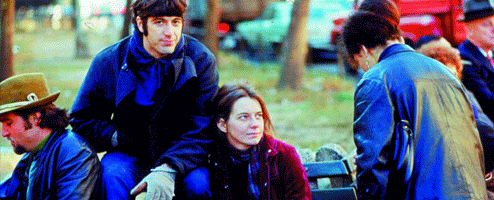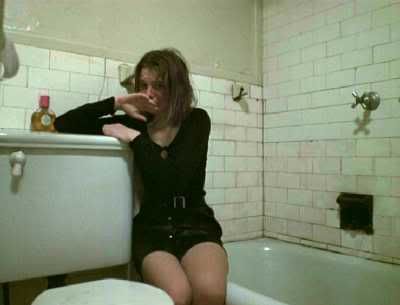
Having recently seen The Panic In Needle Park in its entirety, I can't help but revel in my own no-drugs world. What a bleak, road-to-nowhere existence that its two protagonists, Bobby (played by a young Al Pacino, in his breakout performance) and Helen (played by Kitty Winn, a phenomenal actress who I can't seem to place from any other films without IMDB's assistance), trap themselves within. The setting for such a hellhole being Manhattan's Upper West Side, W.72nd and Broadway, known back in the '70s as "Needle Park" by its large heroin addict population. The Panic In Needle Park is, essentially, a drug ballad, a love story following two lost souls in search of an exit that they can only seem to navigate while strung out. Through a mutual friend, Helen, a painter from Ft. Wayne, Indiana, meets Bobby, a degenerate ex-con/heroin addict going nowhere in life yet getting by on basic sweet-talk. They quickly fall in love, and we ride third-seat as their lives disintegrate into deeper fixes, prostitution, snitching, jailtime, and overdoses.
Not exactly a romance to watch any time near Valentine's Day. Shot in grainy, almost-documentary-like fashion and using no underlying soundtrack, The Panic In Needle Park is brutally frank. Raw like ground chuck. Visceral without trying hard at all. The scenes where the camera closes in on arms' veins being injected with the heroin are hard to sit through, since they look painfully authentic. Figures, then, that, after some research, I've learned that the director, Jerry Schatzberg, reportledly cast 'actual' heroin "Fuck no" if it were today, but considering that this was a no-dollars-spent indie made in 1971 it could've been possible.

The voyeuristic feeling given off here is one amazing thing, but the acting delivered by the two leads is something else entirely. No wonder Pacino went on to snag some meaty roles back in the mid-1970s---he's dynamite here. Like he's not even "acting," but being himself in front of some dude with a camera. Not saying that the guy was a heroin addict (as far I know), though; he's just so believable in Bobby's back-and-forth from sympathetic and loving to animalistic and cunning. In one of Pacino's best moments here, Bobby learns that Helen (who he plans on marrying) was having sex for drugs while he was away on a brief prison stint. The ravenous force that he confronts her with is rough enough to leave Tony Montana shaking.
And then there's Kitty Winn, who, again, never even existed in my "mental actress rolodex" until The Panic In Needle Park's opening credits rolled, and I haven't the foggiest as to why. She's even more unforgettable than Pacino here, in my opinion, and that's saying a bucketful. Before Helen submits to the drugs all around her, she's a clean, innocent, lonely dreamer clinging to the affections that Bobby, and only Bobby, shows. During this portion of the character's development, Winn had me wishing I could meet such a cute ride-or-die chick, a girl able to look past a man's crystal clear faults and focus on her love for dude. Of course, at her own peril, which this film never lets Helen get away with, at all. Once she's gotten her first fix, Helen becomes even more erratic and unstable than Bobby, and its in this latter section that Winn had me wondering if she'd received an Oscar nod for this performance (she didn't, though she did rightfully win Best Actress at '71's Cannes Film Festival).

One scene where Winn really broke my heart was also one that was a bit tough to watch for a dog lover such as myself. Deep into the story, when both Bobby and Helen routinely "get off" on their fix of choice, there's a momentary lapse of stupidity, and they flirt with the idea of living a better, wiser life. Their first step is to buy a cute puppy, which Bobby names "Rocky." On their way home from getting Rocky, they're on a ferry, petting the new dog and generally feeling good. Dumbass Bobby, unfortunately, forces Helen to get high with him in the men's bathroom, during which she leaves Rocky out on the wing of the ferry. As Helen stumbles out of the shitter higher than a kite riding wind, she sees Rocky run off the edge of the ferry, into a choppy water grave. Tears flow, disbelief sets in, and sadness cracks through a drug-clouded mind. It's a small scene within the film's larger context, but it totally wiped me out.
Dog scene included in this Youtube-available portion, if you want to test your heart's stamina with it:
The Panic In Needle Park is easily right up there next to films like Requiem for a Dream in the "watch this if you're ever tempted to start down a drug path, you weak-minded fool." It wouldn't be too risky of a guess to say that filmmakers hailing from New York City must love this flick; without even trying, it drops you smack-dab in the heart of Manhattan. I wasn't even a thought in Anne Barone's head back in 1971, so I can't say that The Panic In Needle Park is an "accurate depiction of NYC at that time." I can say, though, that the film felt totally real in relation to the NYC of 2003-and-beyond that I do know firsthand. Which is quite a testament to director Schatzberg's work here.
Before closing.....I can't help but wish I could chat with We Own The Night's writer/director James Gray about this flick. There's a scene here that has Pacino's Bobby acting as a spectator in an apartment's living room "cocaine factory," and like the similar moment in We Own The Night, its a quiet, paranoid nervewracker. Almost as if Gray directly lifted it for his own film nearly 20-some-odd years later.




1 comment:
I watched the movie last night, on my DVD player alone. Stunning indeed. I think that besides the dog scene, which impressed me too, there is another brilliant devastating scenes: the one when Bobby discovers that a client of Helen is an innocent teenager, who is then robbed - this is suggesting that innocence is no longer possible
Post a Comment